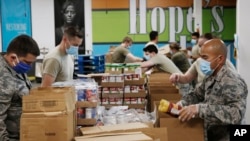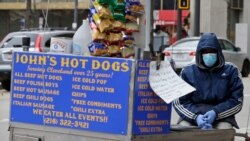Another 4.4 million U.S. workers claimed unemployment compensation last week as the coronavirus pandemic continues to wreak havoc on the U.S. economy, the Labor Department reported Thursday.
The newest total boosted the five-week total to 26.5 million, even as a few states are beginning to devise ways to reopen some businesses in the coming weeks. But millions more workers could file for jobless assistance in the next few weeks as the full effect of the coronavirus crisis on the world's biggest economy takes hold.
The United States has not seen this level of job losses — nearly one out of every six workers — since the Great Depression in the 1930s. The scope of the layoffs has wiped out the entirety of U.S. job growth since the 2008 recession.
Some companies laid off workers quickly in mid-March as the spread of the coronavirus became apparent. But other companies vowed to keep paying their workers, at least for a while, even as many of them had little work to do as their potential customers stayed home to protect themselves and their families.
Some companies have now laid off these workers as well, as the depth of the country's economic turmoil takes hold. Economists say the current U.S. unemployment rate could be approaching 20%.
The U.S. Congress has boosted the widely varying unemployment compensation paid by states by $600 a week for four months. States often make payments to laid-off workers that account for not quite half of what they were being paid.
Some forecasters say the U.S. economy will shrink in the April-to-June period by its biggest figure since the end of World War II.
Credit Suisse is predicting a 33.5% decline, with investment banker Goldman Sachs slightly higher at 34% with a 15% unemployment rate.
However, Goldman is predicting a robust 19% gain in the third quarter from July through September as the U.S. moves toward a possible recovery from the pandemic.
Unknown timeline
The newest weekly total for jobless assistance claims is smaller than those of the last three weeks, when millions more applied for help. That possibly suggests that the downturn has stabilized to a degree.
But what is unknown is how long businesses will remain shut or operating only on a curtailed basis, leading to weeks of heightened layoffs. Millions of people could be out of work through the end of 2020.
U.S. President Donald Trump is pushing to reopen parts of the country to business again in a week, but he said Wednesday that he "disagreed strongly" with one state governor, in Georgia, who announced plans to move quickly to reopen such businesses as hair and nail salons and gyms.
"It's just too soon," Trump said.
Plea for testing
Executives of some of the country's biggest corporations have warned Trump that more coronavirus testing needs to be done before workers return to their jobs.
With federal authorities recommending that Americans maintain at least a two-meter physical distance from other people through the end of April, businesses have been forced to curtail work or shutter operations and lay off workers.
The rapid pace of layoffs is unprecedented in recent U.S. history, although the extent of the economic damage is not precisely known. It took two years during the Great Recession in the two-year period between 2007 and 2009 for 8.6 million people to lose their jobs.
Numerous supporters of Trump have been pushing him to reopen the U.S. economy. Some relatively small street protests have occurred in recent days, with demonstrators demanding that government officials call off the business shutdowns to let them go back to work.
But numerous stories are also appearing in U.S. media outlets of the deaths of people who voiced doubts they could be fall victim to the coronavirus and instead ventured into public places and were fatally infected.






